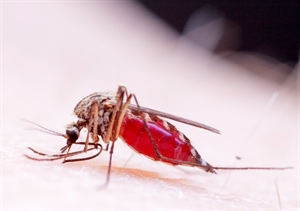Bug bites can be itchy and painful – but they can also expose you to pathogens that cause some dangerous diseases. Travelers may come across insect disease vectors that aren’t present in the US, and they need to take some extra precautions to protect their health.
When you make a travel health appointment six to eight weeks before your trip abroad, the travel health specialist will tell you about what precautions you should take to avoid insect-borne diseases at your destination.
Getting vaccinated against insect-borne diseases
Some insect-borne diseases can be prevented with a vaccine. These include:
Another insect-borne disease is malaria. We can tell you which antimalarial drugs are best for your trip abroad.
Make an appointment at our travel clinic in Stafford to find out which vaccinations you need for your vacation or business trip.
Vaccines and antimalarials give good protection, but note that you’ll want to support them by taking steps to avoid insect bites. Not all insect-borne diseases can be prevented by vaccination.
Insect-borne diseases that affect travelers
Some examples of diseases that travelers might get from an insect bite include:
- Chagas disease
- Lyme disease
- malaria
- plague
- Dengue fever
- sleeping sickness
Some of these can cause serious or even fatal illness, and some of them last a long time, causing you to miss work or school after you return from your trip abroad. Avoiding insect bites will help reduce your risk of getting ill while you are traveling.
You can protect yourself from bug bites by using an EPA-registered insect repellent. The EPA has a search tool to help you find the right insect repellent for your activities and health status. You can also ask for advice about insect repellents at your pre-travel health consultation.
Which diseases are spread by mosquitoes?
Diseases carried by mosquitoes are:
- Chikungunya fever
- Dengue fever
- filariasis
- Japanese encephalitis
- malaria
- Oropouche virus
- pogosta disease
- West Nile disease
- yellow fever
- Zika
Use mosquito repellent, particularly at dawn and dusk. But different regions have mosquito species that fly at different times, so take local advice on when to step up your mosquito precautions. Wearing clothing with good coverage will also help protect you from mosquito bites.
Avoid tick bites to stay healthy while traveling
Checking your body and clothing for ticks should be second nature if you’re an experienced hiker. These arachnids attach themselves to exposed skin to feed off blood. They carry some dangerous diseases, including:
- babesiosis
- tick-borne encephalitis
- Heartland virus
- Lyme disease
- rickettsial diseases
If you are traveling to work in agriculture or forestry, or if you’ve got outdoor activities planned on your trip abroad, then you’ll want to take steps to avoid exposure to ticks. Stay out of brush and long grass, and treat your clothing with 0.5% permethrin.
Showering after a day in the woods will remove any unattached ticks. Should you find a tick on your body, use a tick removing tool to extract it as soon as possible.
Bespoke travel health advice
A travel health appointment with Global Travel Clinics will help you to protect your health from insect-borne diseases.


Book Online